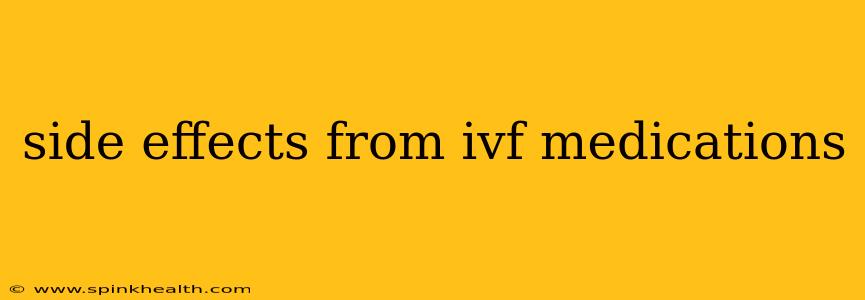The journey to parenthood through In Vitro Fertilization (IVF) is a deeply personal one, filled with hope, anticipation, and, for many, the reality of managing various side effects from the powerful medications involved. This isn't a story about a single experience, but a collection of common occurrences, offering a nuanced understanding of what women might face. Let's embark on this journey together.
Imagine Sarah, a vibrant woman in her late 30s, dreaming of motherhood. After years of trying to conceive naturally, she and her partner chose IVF. The excitement was palpable, but so was the apprehension. The first step? The medications. And these medications, while crucial to the success of IVF, can come with a range of side effects.
What are the common side effects of IVF medications?
This is a question many women ask themselves as they begin this process. The answer isn't simple; the side effects vary greatly depending on the specific medications prescribed, individual reactions, and dosage. However, some common side effects include:
-
Ovarian Hyperstimulation Syndrome (OHSS): This is perhaps the most feared side effect. OHSS occurs when the ovaries become significantly enlarged due to the stimulation medications, leading to discomfort, bloating, nausea, and in severe cases, fluid buildup in the abdomen and chest.
-
Hot Flashes: Many women experience intense hot flashes, similar to those experienced during menopause. These can be uncomfortable and disruptive to daily life.
-
Mood Swings: The hormonal fluctuations caused by IVF medications can significantly impact mood, leading to irritability, anxiety, depression, and emotional instability. This is completely normal but requires support and understanding.
-
Headaches: Headaches are a fairly common side effect, ranging from mild to severe.
-
Nausea and Vomiting: These gastrointestinal side effects are often manageable but can be quite debilitating for some women.
-
Breast Tenderness: Many women experience increased breast tenderness and sensitivity.
-
Weight gain/fluctuations: Some women experience weight gain or fluctuations during the treatment.
-
Fatigue: The entire IVF process, including the medication regimen, is physically and emotionally demanding, leading to fatigue.
What if I experience severe side effects from IVF medications?
This is a crucial question, and the answer is simple: contact your fertility clinic immediately. They are equipped to manage complications and adjust your medication plan accordingly. Severe side effects require prompt medical attention.
Can I reduce the risk of side effects from IVF medications?
While you can't entirely eliminate the risk, you can take steps to mitigate potential side effects:
-
Open Communication with your Doctor: This is paramount. Your doctor needs to understand your medical history, concerns, and any existing conditions.
-
Following your Doctor's Instructions Precisely: Strict adherence to the prescribed medication regimen is vital.
-
Maintaining a Healthy Lifestyle: A balanced diet, regular exercise, and adequate rest can help your body cope with the hormonal changes.
-
Stress Management Techniques: Stress can exacerbate side effects. Practicing relaxation techniques, such as yoga or meditation, can be beneficial.
What are the long-term effects of IVF medications?
The good news is, most side effects are temporary and resolve once the medication is discontinued. Long-term effects are rare, but potential risks include an increased risk of ovarian cysts and a slightly elevated risk of certain types of cancer. However, these risks are generally low and need to be weighed against the benefits of IVF.
Are there any alternative treatments to IVF that might have fewer side effects?
Yes, there are several alternative treatments for infertility, each with its own set of benefits and potential drawbacks. These include Intrauterine Insemination (IUI), which is less invasive than IVF and involves fewer medications, and other fertility treatments. Discussing these options with your doctor will help you make an informed decision based on your specific circumstances.
Sarah's journey was challenging, but she persevered. She managed her side effects with the help of her medical team and support system, ultimately achieving her dream of motherhood. Her story, and countless others like hers, emphasizes the importance of understanding the potential side effects, open communication with medical professionals, and the unwavering support of loved ones throughout the IVF process. Remember, every woman's experience is unique, and the challenges are often outweighed by the immense rewards.

